Public Policy
C2P2: Building a Stronger, More Inclusive Construction Workforce
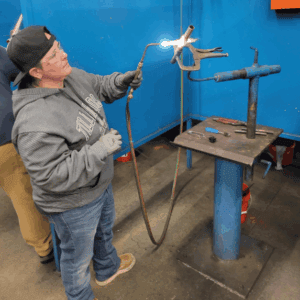 A strong and diverse workforce is essential to building healthy, resilient communities, and Oregon Tradeswomen is proud to be part of the regional collaboration making that vision a reality.
A strong and diverse workforce is essential to building healthy, resilient communities, and Oregon Tradeswomen is proud to be part of the regional collaboration making that vision a reality.
Across the greater Portland area, demand for skilled tradesworkers is on the rise. Over the next decade, 22,000 construction jobs are expected to open as major public infrastructure projects move forward. Yet, the workforce is shrinking and aging… 22% of current workers are nearing retirement, while only 8% of new workers are under 25. At the same time, many aspiring tradespeople face barriers to entering and staying in the field, from access to affordable and reliable childcare and transportation, to jobsite harassment and limited mentorship opportunities.
Led by local public agencies who have made policy commitments, and supported by organizations like Oregon Tradeswomen, Construction Career Pathways (C2P2) is a regional strategy to grow and diversify the construction workforce. By investing in pre-apprenticeship training, apprenticeship access, and on-the-job retention supports, this collaborative effort is ensuring that women and BIPOC job-seekers have equitable opportunities to build rewarding, family-wage careers in the trades.
At Oregon Tradeswomen, we see every day how breaking down these barriers changes lives, not just for individual workers, but for families and communities across our region. When more people can succeed in the trades, we all benefit from stronger infrastructure, greater economic resilience, and a workforce that reflects the diversity of our community.
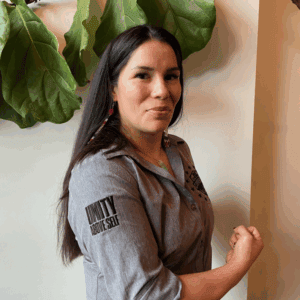
Metro Regional Government’s new Construction Careers Pathways Regional Dashboard highlights the real impact of these efforts, including hard data and compelling stories demonstrating the progress being made to build a better future for all workers. You can also discover active and completed public projects impacted by these efforts.
Visit the dashboard to learn more about how Oregon Tradeswomen and our partners are helping to shape a strong, inclusive, and sustainable construction industry for our region’s future.
2021 DJC Building Diversity Awards

- GeoEngineers
- Todd Duwe, Perlo Construction
- Meyer Memorial Trust headquarters project
- Mel Jones, JE Dunn Construction
- Román Hernández, Troutman Pepper
- Kelly Kupcak, Oregon Tradeswomen Inc.
- Wenaha Group
- Portland Building reconstruction project
- RKm Development
- The Skanner (lifetime achievement award)
- Center for Equity & Inclusion
- Advanced Tribal LLC
- Hacienda Community Development Corp.
- Angela Watkins, Minority Construction Group and Constructing Hope
- NAMC University
- Safe from Hate initiative
Working to Change Jobsite Culture in our Region
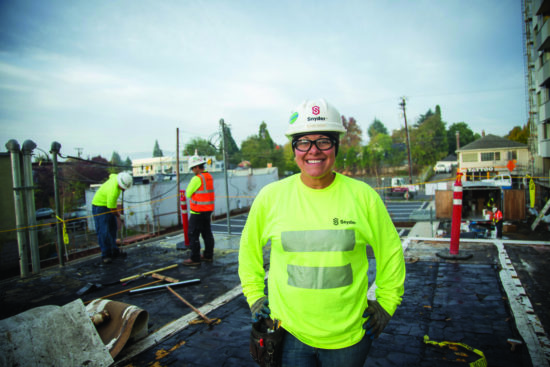
We are proud to be a part of advocacy work has played a role in creating and supporting needed changes in our region’s construction industry including participating in the Safe From Hate Alliance – the industry-wide effort to make workplace culture more welcoming to women and people of color – to our ongoing work hosting the Tradesworker Equity Council. Together, we are making a difference…
Almost one year ago, Oregon Tradeswomen graduate and UA Local 290 member Leslie Cotton found a noose on job-site where she was working as an apprentice plumber. Since that incident, industry and community has rallied together under the umbrella of the Safe from Hate Alliance to work together to eliminate job-site harassment, hazing, and bullying to create respectful worksites for everyone.
Last week, the Oregon Senate passed SB 398, making it a crime to display a noose. It’s sad we need a law to outlaw hate but is an important piece of the work to eliminate it from our communities and our construction industry. Oregon Tradeswomen thanks the bill’s sponsors Senators Ginny Burdick (D-18), James Manning Jr. (D-7), Michael Dembrow (D-23), Lew Frederick (D-22), Sara Gelser (D-8), Kayse Jama (D-24), and Senate Majority Leader Rob Wagner (D-19) for their leadership. Should the bill pass the House, Oregon would join a growing list of states that have already made it a crime to display a noose. Some, like New York, provide for felony charges.
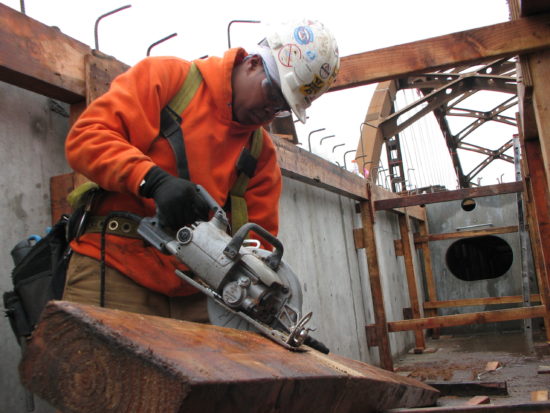
The Safe from Hate Alliance is comprised of industry employers, trade associations, unions, registered apprenticeship programs, government, public owners, and nonprofits working to ensure all workers can be safe on their job-sites and work in an environment that is respectful for everyone. This work includes a job-site culture pledge which outlines four pillars to creating respectful workplaces:
1. a zero-tolerance jobsite policy
2. Implementation of a jobsite culture program
3. Work with community partners to recruit diverse talent – including community—based pre-apprenticeship training program such as Oregon Tradeswomen’s Trades and Apprenticeship Career Class
4. Cultivate leadership and retention efforts for women and Black, Indigenous, and People of Color – we do this at Oregon Tradeswomen through our Retention Services Program which includes monthly Trades Social Hours and our annual Tradeswomen Leadership Institute.
Through our program and advocacy work, Oregon Tradeswomen is working to address each of these pillars. Working in partnership with the members of the Safe from Hate Alliance, we are supporting the Tradesworker Equity Council, comprised of apprentices and journeyworker who are most impacted by toxic job-site culture, to have a voice in public policies that affect them most in the workplace and apprenticeship. The Council members are reviewing zero tolerance and other job-site policies to help make changes that will decrease hazing, harassment, and bullying, and increase retention of women, BIPOC and LGBTQ+ tradesworkers.
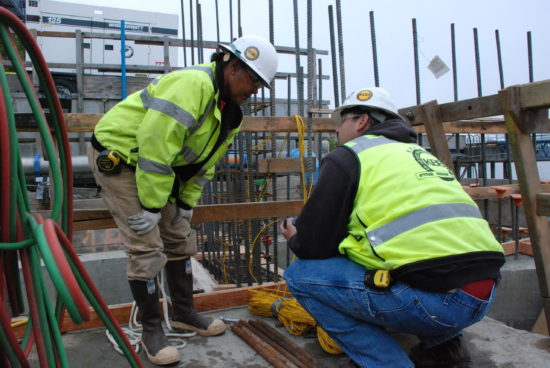
In a new partnership with PBDG, Oregon Tradeswomen recently became the Oregon affiliate for the RISE Up 4 Equity Program. Created for the construction industry, RISE Up (respect, inclusion, safety, and equity) was developed by our sister tradeswomen organization in ANEW, based in Seattle.
Rise Up includes bystander intervention and harassment prevention training for the job-site. Training goes beyond leadership at the executive level to front-line supervisors and tradesworkers on each job-site. After reviewing existing promising models across the county and Canada, Oregon Tradeswomen was convinced that the RISE Up 4 Equity Program was the most holistic approach to changing job-site culture. To learn more about process and recommendations, read the recommendations report, Tools to Address Jobsite Culture.
Infrastructure Industry Recovery Panel
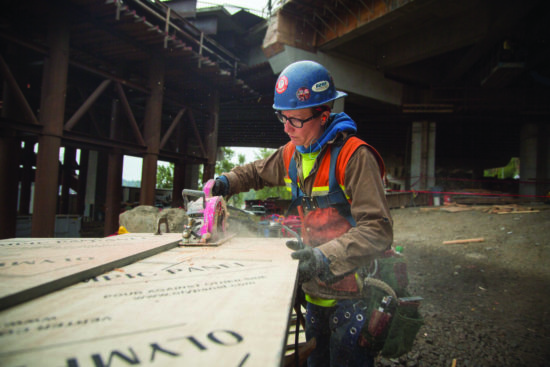
Investment into our nation’s infrastructure is underway through President Biden’s Build Back Better Initiative and for that public investment to make a difference, the economic recovery needs to be inclusive. To that end, the National Skills Coalition and Business Leaders United for Workforce Partnerships have convened an Infrastructure Industry Recovery Panel of industry leaders to share recommendations on the Biden Administration through meetings with White House advisors, the Departments of Energy and Transportation, and Congressional leadership.
Oregon Tradeswomen’s Executive Director Kelly Kupcak, and Board Treasurer and principle of O’Neill Construction Group, Ali O’Neill were invited to serve on the panel!
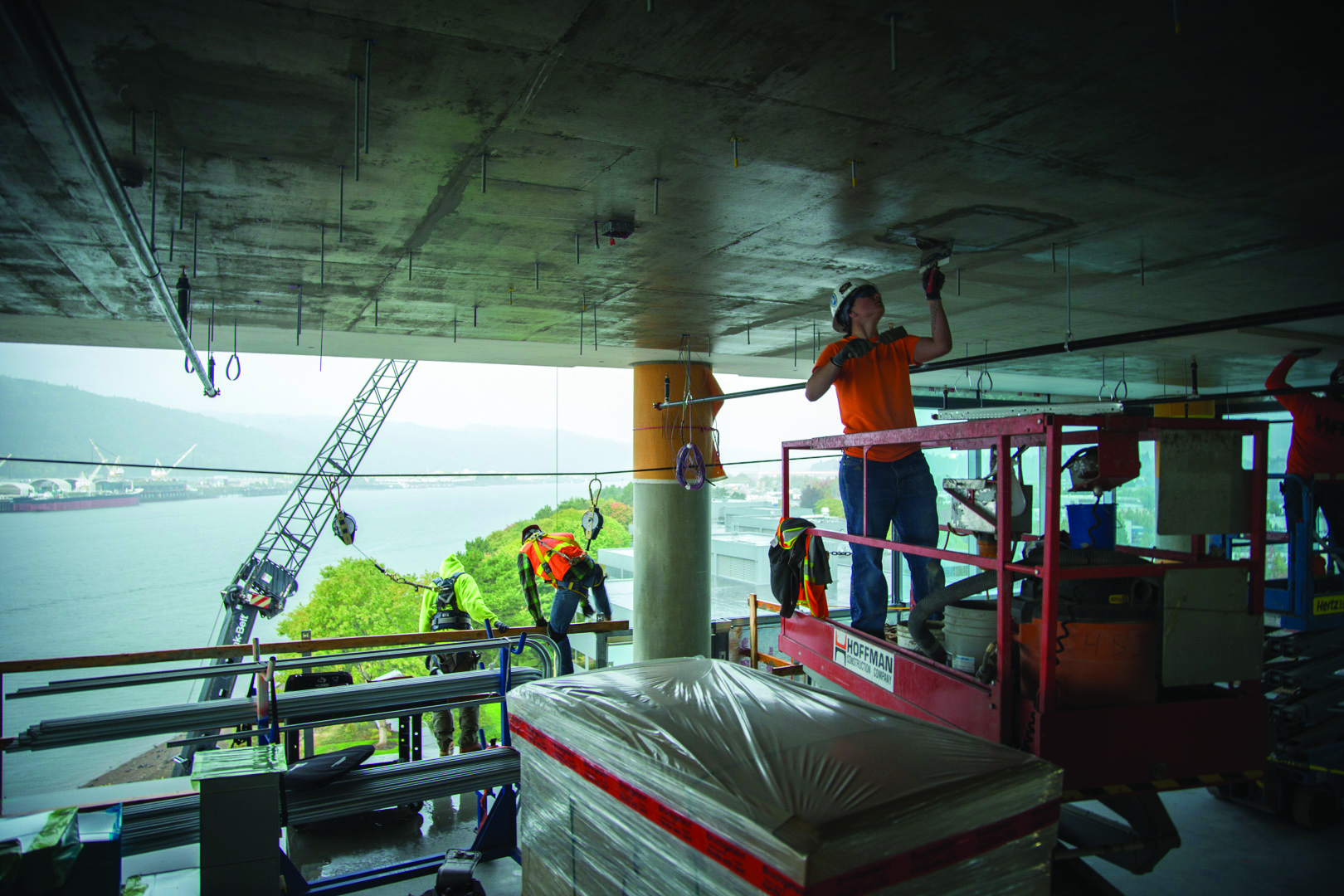
Through our participation on the panel, we will be contributing to recommendations which address the disproportionate impact of the economic crisis on workers of color, immigrants, and workers with barriers to full employment. Through an equity lens, the panel will make recommendations to work towards dismantling structural racism within workforce education and training. Oregon Tradeswomen is also advocating for the ten strategies for an equitable infrastructure outlined by the National Taskforce on Tradeswomen Issues to be included. While skills training alone will not ensure an inclusive recovery, it should be part and parcel of our national plan and federal public policy.
Construction Task Force: COVID-19

TASK FORCE LAUNCHED TO ASSESS AND SHARE CONSTRUCTION JOB SAFETY PRACTICES IN RESPONSE TO COVID-19
[PORTLAND, OREGON, April 24, 2020] — Aiming to increase job safety awareness in response to the COVID-19 pandemic, the Oregon State Building Trades Council has launched a task force to help construction contractors follow current guidelines and protect workers while continuing to do business.
The COVID-19 Joint Construction Safety Task Force – encompassing representatives from the building trades unions, industry partners, management, and employer representatives– has been meeting online three times a week and scheduling visits to various construction sites in Oregon.
A group of five to seven task force members, assisted by Oregon OSHA consultants, are visiting sites to assess the effectiveness of job safety practices intended to address COVID-19 and to make recommendations for improvements. All task force members and Oregon OSHA consultants will practice social distancing while visiting construction job sites. At the same time, the task force – an advisory group – is monitoring the most current health information and government guidelines, and collecting data and information about best jobsite practices. This data and information will be shared with construction contractors and workers.
“The safety of the people who are out there working on construction sites is our highest priority,” said Robert Camarillo, executive secretary for the Oregon State Building Trades Council. “With this task force, our goal is to improve job safety and increase educational resources during an incredibly challenging time.”
Oregon Gov. Kate Brown’s “Stay Home, Save Lives” executive order – issued in response to the coronavirus outbreak – does not include construction among the businesses that must close.
The COVID-19 Joint Construction Safety Task Force is a partnership of union and non-union industry professionals, with support from Oregon OSHA. Its membership includes:
- Associated General Contractors-Oregon Columbia Chapter
- Central Oregon Building and Construction Trades Council
- Columbia-Pacific Building and Construction Trades Council
- Hoffman Construction Company
- Lane, Coos, Curry, Douglas Building & Construction Trades Council
- O’Neill Electrical Construction
- Oregon Home Builders Association
- Oregon OSHA
- Oregon State Building and Construction Trades Council
- Oregon Tradeswomen
- Pacific NW Regional Council of Carpenters
- Pendleton Building and Construction Trades Council
- Plumbing and Mechanical Contractors Association
- Salem Building and Construction Trades Council
- Southern Oregon Building and Construction Trades Council
- University of Oregon Labor Education and Resource Center, LERC
- Worksystems
Download a .pdf of the press release
For questions about the construction task force, contact:
Mary Ann Naylor, communications director
Oregon Tradeswomen
maryann@tradeswomen.net
Individual Contacts:
Robert Camarillo, executive secretary
Oregon State Building Trades Council
robert@oregonbuildingtrades.com
Mike Salsgiver, executive director
Associated General Contractors – Oregon Columbia Chapter
mikes@agc-oregon.org
Matt Swanson, political coordinator
Pacific NW Regional Council of Carpenters
mswanson@nwcarpenters.org
Mark Long, chief executive officer
Oregon Home Builders Association
mark@oregonhba.com
Aaron Corvin, public information officer
Oregon OSHA
aaron.corvin@oregon.gov
Healthy Communities Coalition: Broadway Corridor Project
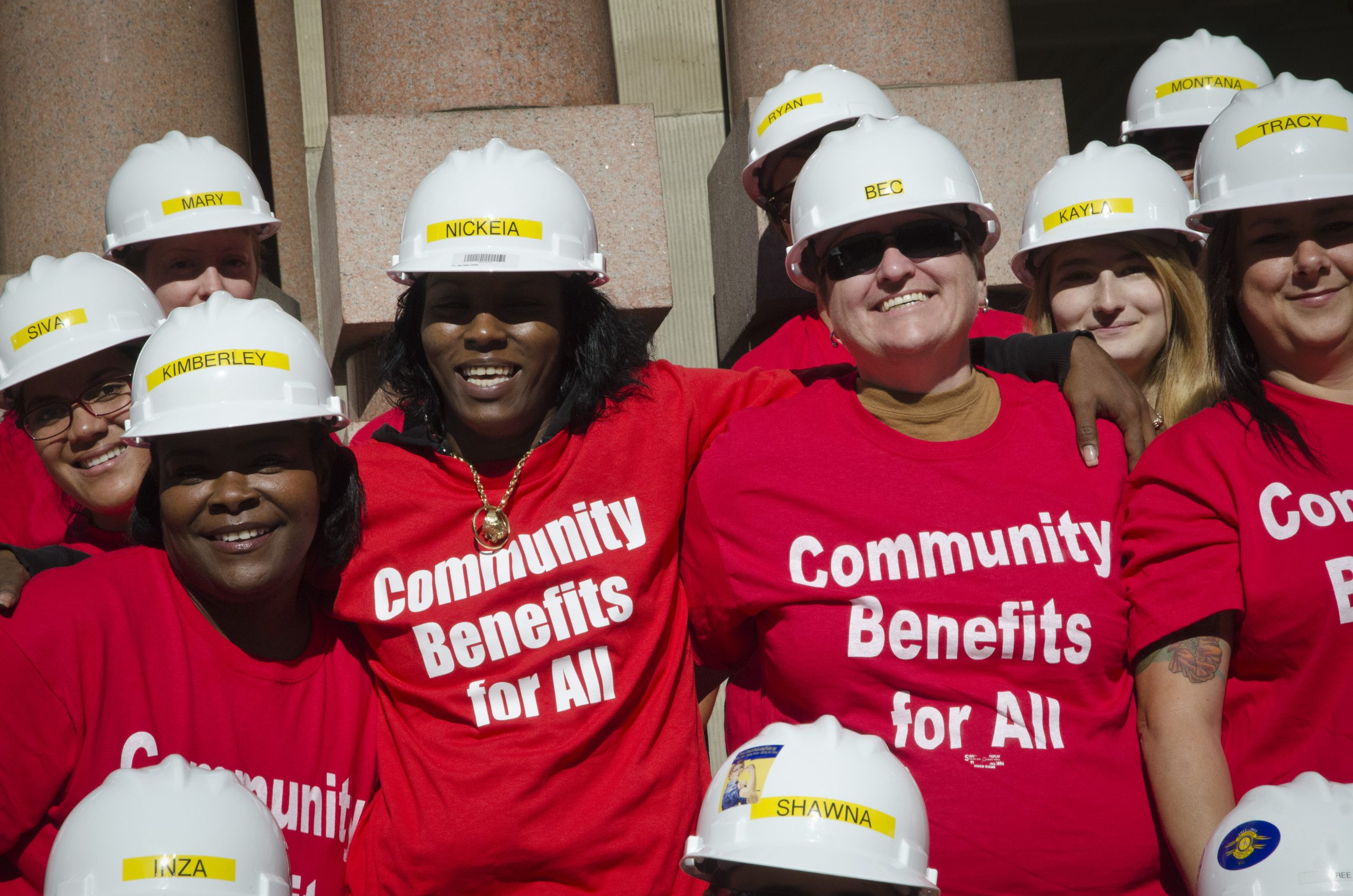
Oregon Tradeswomen is committed to ensuring women, people of color, low-income communities, and other historically disenfranchised groups benefit in publicly funded projects through access to quality job training, support services, job placement support and high-wage careers.
As part of our public policy and advocacy work, Oregon Tradeswomen endorses the Metropolitan Alliance for Workforce Equity (MAWE) Community Benefits Agreement model as a policy framework for ensuring access, opportunity, and equity on all publicly funded projects, including the Broadway Corridor Project.
We are working in coalition as a member of the Healthy Communities Coalition (HCC) – a group of 20+ organizations negotiating a legally-binding Community Benefits Agreement (CBA) with Prosper Portland, Continuum Partners, and the City of Portland on the Broadway Corridor redevelopment in downtown Portland. HCC wants to ensure that the City of Portland and Prosper Portland support standard-setting new benefits to advance good jobs, affordable housing, and equity for Black, Indigenous, People of Color, and working class communities.
The Broadway Corridor is 34 acres that connects or includes landmarks and neighborhoods such as Old Town Chinatown, the Pearl District, Union Station, the Pacific Northwest College of Art and the U.S. Post Office, which will be demolished as part of redevelopment. Historically, the Broadway Corridor has been the home for communities of color who have been forcibly displaced over the past century as a result of “the effects of racialized policies, practices, and decision-making.”
The Broadway Corridor is on the land that has been home for Multnomah, Wasco, Cowlitz, Kathlamet, Clackamas, bands of Chinook, Tualatin Kalapuya, Mollala and many other tribes. Black Americans, many of them porters who arrived from Union Station, lived in, created and supported Black-owned hotels and other businesses in the early 20th century. It was once the home of to Japanese Americans until the U.S. government’s internment order in 1942 that forced these Portlanders to leave their homes and businesses.
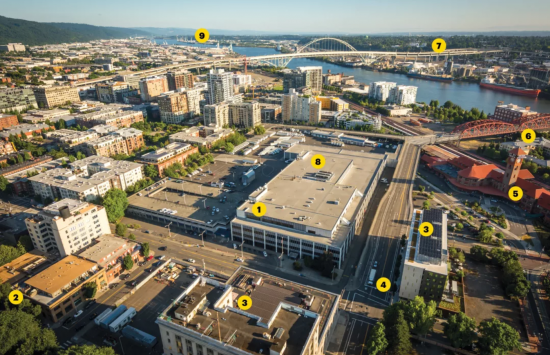
This August, the billion dollar development is almost able to move forward after an agreement was reached on the adoption of a development deal as well as a CBA. This consensus guarantees prevailing wages, full-family health care benefits, and the significant inclusion of minority-owned contractors throughout the construction process. In addition to these terms benefiting workers, goals for 100 percent renewable energy to achieve carbon neutrality have also been included.
As the Broadway Corridor Project is in motion, the Portland Housing Bureau committed to reaching out to Black, Japanese-American, and Chinese-Americans (groups who have historically resided in these neighborhoods) offering affordable housing. This effort underscores the integrity of this project, clearly distinguishing it from previous urban developments which have dislocated minority groups.
To oversee the agreed-upon goals, a 10-member committee appointed by HCC and Prosper Portland will be monitor progress on the project – the Broadway Corridor
Oregon Tradeswomen’s Workforce Equity Manager, Jay Richmond, commented on this historic project, noting, “The successful agreement for a CBA on the Broadway Corridor represents a sea change in the way development will be done in the region going forward. We’ve made sure there is meaningful investment in creating a pipeline of opportunity for women, people of color, and working families to enter into the trades. We secured 720 units of affordable housing, family wage jobs, and small business opportunities, as well as construction hiring goals which will have huge positive impacts for BIPOC communities. That said, we know this work has just begun, and look forward to making sure these goals are met through the ongoing oversight of the BCCOC.”
While we are celebrating this positive step, the hard work isn’t over. The Portland City Council must still review and accept the agreements, and the Broadway Corridor master plan is currently under review by the Portland Design Commission. Ultimately, we are hopeful the success of these negotiations will serve as the model for future projects to intentionally bring benefits to the communities where these construction projects happen.
Preserving the Registered Apprenticeship Model
Since the introduction of the Industry Recognized Apprenticeship Program (IRAP) concept, there has been concern in the field about creating another form of apprenticeship including oversight, alignment, equity components, and guidance on how employers implement anti-harassment and discrimination requirements as well as other issues such as portability, and industry standards. The DOL’s proposed rule would formally include IRAPs in the Code of Federal Regulations (29 CFR Part 29) that govern the RA system under the National Apprenticeship Act of 1937.
Additionally, the rule aims to establish a process to authorize third-party “Standards Recognition Entities (SREs)” that would recognize IRAPs. The proposed rule describes what entities may become SREs; what their responsibilities and requirements would be; hallmarks of the high-quality apprenticeship programs they would recognize; and how the administrator of the Office of Apprenticeship would interact with them. The rule also describes how IRAPs would operate in parallel with the RA system.
This proposed rule change is an important moment that will affect the future of apprenticeship and access, opportunity and equity in apprenticeship – please take time to respond to public comment in sharing your knowledge and expertise during this comment period.
Download the Talking Points document
The deadline to submit comments is August 26, 2019! Please make your voice heard!
Representative Bonamici Celebrations 2018 National Apprenticeship Week
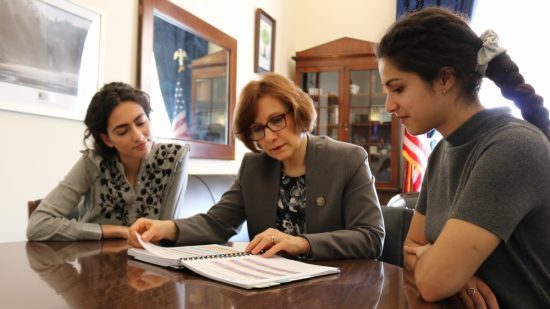
On Thursday, November 15, Women in Apprenticeship Day, Congresswoman Suzanne Bonamici (D-OR), Vice Ranking Member of the House Education and the Workforce Committee, celebrated National Apprenticeship Week and Women in Apprenticeship Day by advocating for more investments in apprenticeships and work-based learning programs.
“Efforts to get our economy back on track have benefited some, but far too many working families are still struggling to make ends meet,” Congresswoman Suzanne Bonamici said on the House floor. “As we recognize National Apprenticeship Week and Women in Apprenticeship Day, we must commit to strengthening apprenticeships and work-based learning programs.
“The PARTNERS Act and funding for the Workforce Innovation Opportunity Act are two pieces of the greater need to invest in apprenticeships and other paid, on-the-job training programs. Investing in these programs will help more people access better paying, stable careers, and provide our nation’s businesses with a workforce that will improve productivity and efficiency.”
Watch the full video of Bonamici’s floor speech.
Bonamici is a champion in Congress for apprenticeships and work-based learning programs. The first bill signing Bonamici attended was for the Workforce Innovation and Opportunity Act (WIOA) when it passed Congress in 2014. Additionally, she has been a leader in efforts to increase funding for the Workforce Innovation and Opportunity Act and Women in Apprenticeship and Nontraditional Occupations grants.
In 2017, she introduced the bipartisan PARTNERS Act to boost apprenticeships and work-based learning programs. The PARTNERS Act would establish a grant program to support the creation and expansion of industry partnerships to help small and medium sized businesses develop work-based learning programs and provide support services for workers.
Oregon Tradeswomen extends our deepest gratitude to Congresswoman Bonamici for her support of apprenticeship, and calling for stronger investments in paid, on-the-job training programs to allow more people to attain living-wage careers with benefits, and providing a pipeline of skilled workers to industries strongly in need of building their workforce.
Portland Metro Region Construction Workforce Market Study
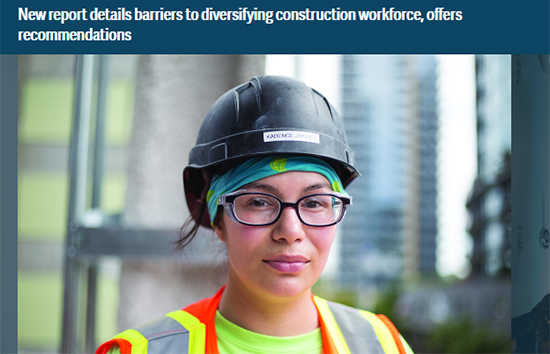
Oregon Tradeswomen works to increase the number of women and people of color entering the skilled trades, but there are still significant barriers that make recruitment and retention of a challenge. A Workforce Market Study was jointly commissioned in January 2017 by The City of Portland and Metro, (Oregon regional governance and the only one in the nation), with the support of Oregon Tradeswomen, the National Association of Minority Contractors of Oregon (NAMCO), Oregon Employment Department (OED), Portland State University (PSU), and Worksystems Inc. to learn more about how to invest in equitable growth through diversifying our workforce.
Why should we care about diversifying our workforce? The new report states, “Diversifying the construction workforce will not only help create a stronger supply of needed workers for the industry, it will also directly address issues of poverty and economic mobility within communities of color and working families in the region.” The construction industry is also in the midst of a labor shortage. Ideally, we can prepare women and minorities to be those ideal candidates to help fill the labor gap. It isn’t as easy as it seems, though, as the study identifies barriers that make recruitment and retention of these demographics a challenge.
The study outlined 9 main barriers that hinder recruitment and retention of women and minorities in the trades. Many trades jobs come from personal referral, say from a father or friend who is already in the industry. The study shows that women and minorities have less of these gateway experiences. This goes hand in hand with the fact that there are not many communities or social networks within the industry for women and people of color which minimizes the exposure someone from those communities might have to the trades. It was also found that marginalized communities face more hardships than others due to financial issues, child care, transportation, among other things that can stand in the way of them continuing their careers.
Although Oregon Tradeswomen does great work preparing women to join the construction workforce and gives them support throughout their careers, however, there are limits to our capacity to train students, primarily due to structural limitations as to when we can conduct training and offer hands-on experiences to build skills. More than 1,100 women seek our pre-apprenticeship training each year. The problem isn’t that women aren’t interested in a career in construction, but rather, we have a limited number of slots in each cohort. This is a common barrier among pre-apprenticeship and job-readiness programs.
Some of the other barriers that keep women and people of color from continuing a career in the trades are the outdated policies that shape noninclusive jobsite cultures where women and people of color experience sexist and racist attitudes. These policies can foster hostile work environments, poor-quality training for new workers (which then makes it harder for those workers to excel and advance), and fewer opportunities for promotion for women and people of color.
As a way to address the disparity in our region, the study outlined three goals:
- Increase recruitment of diverse workers
- Increase retention of diverse workers
- Develop more robust equity policy and practices
Each of the goals are broken down into action items such as “Ensure steady funding streams to increase capacity of pre-apprenticeship programs,” “Address construction job site culture through respectful workplace trainings with proven results,” and “Enforce contract goals with consequences of non-compliance.”
While there is much work to be done, this study clearly marks a path that we as a community, and hopefully one day as a country, can work towards. There are countless women and people of color who are willing and able to do good work in the construction industry and help fill the labor shortage, but it is the industry as a whole that needs to step up to properly set these workers up for success.
Read the full Portland Metro Region Construction Workforce Market Study.
A World of Difference Features Oregon Tradeswomen
MediaLab, an applied research and media production organization affiliated with Pacific Lutheran University’s School of Arts and Communication, launched a new series, “A World of Difference,” where the producers explore gender, race, national origin, and ask the question, “How do we value difference?”
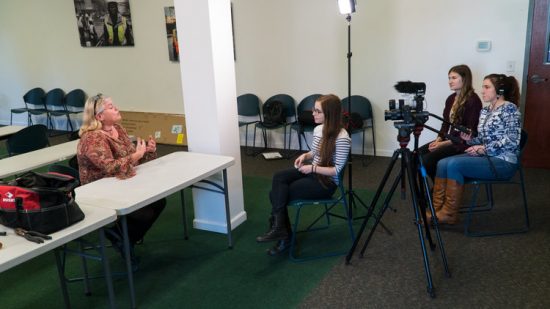
Each of the four episodes focuses on new topics in different cities. The second episode was filmed in Portland, and investigates gender, specifically in the construction industry. Women comprise a mere 3% of the national construction trades workforce, but in Oregon, nearly 7% of apprentices in the skilled trades are women.
Oregon Tradeswomen’s Executive Director, Kelly Kupcak, and Director of Training, Amy James Neel, had the opportunity to speak with MediaLab about this disparity and what Oregon Tradeswomen is doing to bridge the gap.
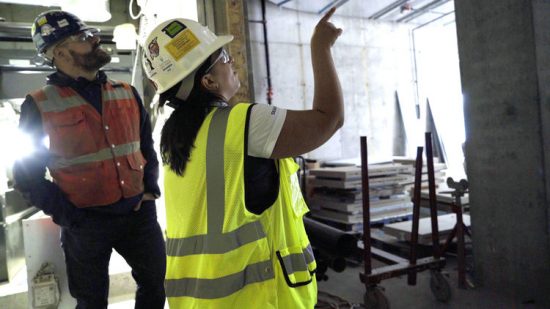
We are humbled by the opportunity to share with the world the work Oregon Tradeswomen does. We applaud MediaLab for their efforts to open a discussion recognizing the experiences of people in marginalized communities and what can be done to make a difference.
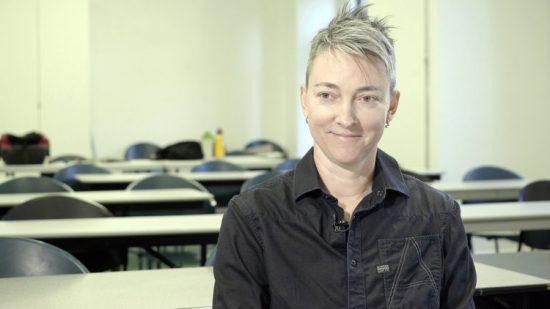
The series premier of “A World of Difference” took place on Saturday, February 17, 2018 at the Seattle Public Library. You can find the episodes available for rent or purchase on Vimeo.
